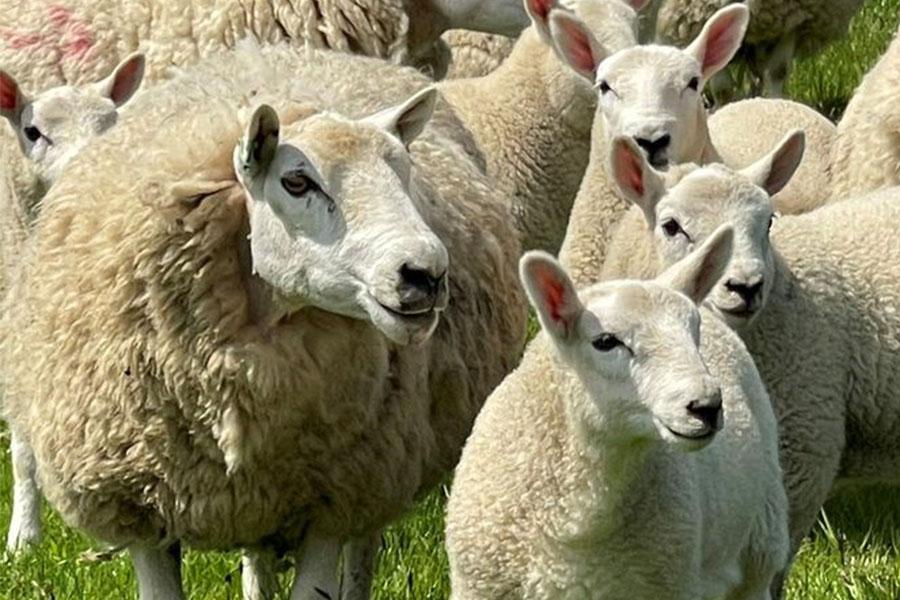Our Strome Scottish Wool Kilt Cloth
As the world's leading manufacturer of tartan, we feel it is important to adapt and develop with what is becoming one of the most important influencing factors of modern times, environmental sustainability. And our 100% Scottish Wool Strome Kilt premium quality cloth does just that!
Launched in 2021, this major project at Lochcarron of Scotland took around 2 years of planning and development. Our traditional 16oz cloth is the perfect handle for creating authentic Scottish kilts, so it was only natural for its next step, sourcing 100% British Wool. This was in fact, 70-80% Scottish wool, sourced from Cheviot sheep and 20-30% British-farmed Romney Marsh sheep. Quickly working with our first deliveries of British Wool, the months that followed involved converting the fibre into stocks of Strome tartan. Combining yarn from our previous Strome cloth and our all-new British Wool reduced unnecessary waste of resources with the aim of soon manufacturing a 100% British Wool Strome tartan. By making this change, we were converting between 20-25% of the wool yarn that we purchase to Scottish sources.
As of April 2023, we have sourced fleece from Scottish-farmed Romney Marsh sheep allowing us to complete the journey towards creating a 100% Scottish wool product. We are delighted to get to this point in improving our ethical and sustainable journey. From farm to fabric, fleece to fashion we are supporting Scottish and British woolgrowers and British manufacturing without compromising quality, supply or service. Watch the journey of how we make our Scottish Wool Strome Kilt Cloth on YouTube and read on to learn more about the production of this truly Scottish fabric.
The Environmental Benefits of Wool
At Lochcarron of Scotland, we have a good starting point, already we use a lot of wool in our manufacturing process. Wool is one of the world's most sustainable fibres as it is biodegradable AND renewable. It doesn’t deplete natural resources, if there is grass for sheep to eat, wool will continue to grow naturally. Every year, sheep in the UK grow between 1 and 3 kgs of raw wool, which for the animal’s health must be sheared. Therefore, it would be a shame not to make the most of it!
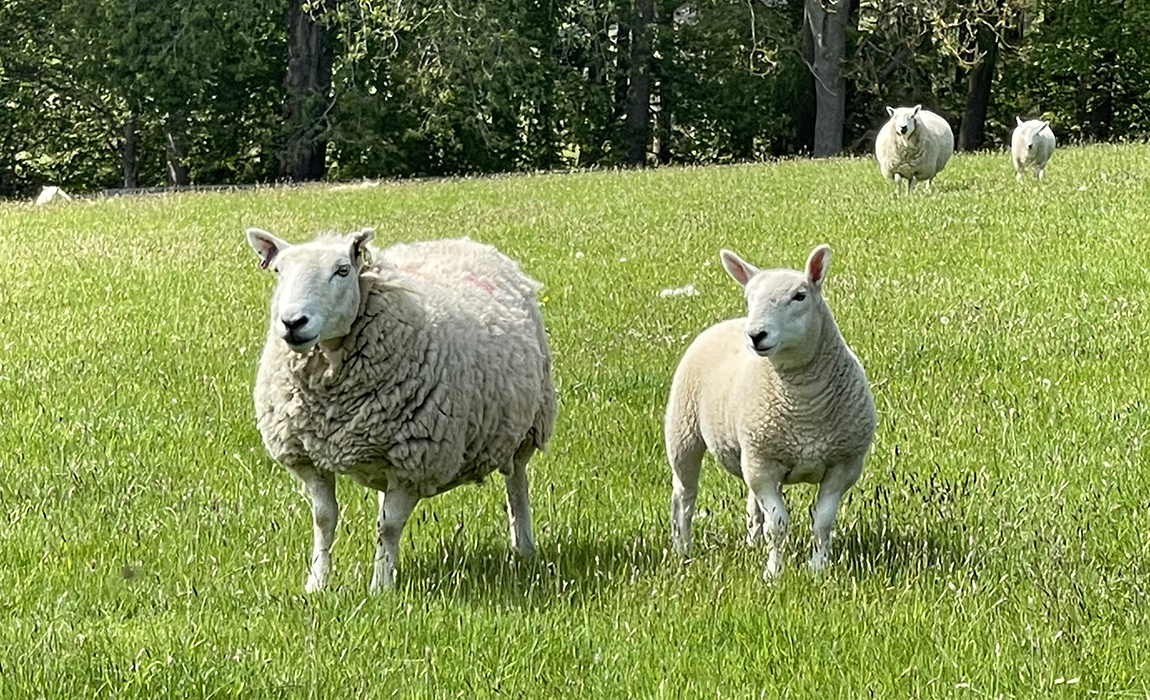
Longevity of Natural Fibres
Another advantage is the longevity of wool. On average, products made from wool can last considerably longer than those made from other fibres. It is highly durable and can withstand a lot of wear, as well as being breathable and easy to wear. It is a material that requires less washing, just hanging the garment up allows the moisture to evaporate and remove odours. Furthermore, wool has the ability to react to changes in your body temperature, as an active fibre, it helps you stay warm when it's cold and keeps you cool when it is warm.
There is no season that wool is not suitable for, so be sure to maximise the sustainability of your wardrobe with wool. And remember, wools long lifespan means that it can often be reused and recycled.
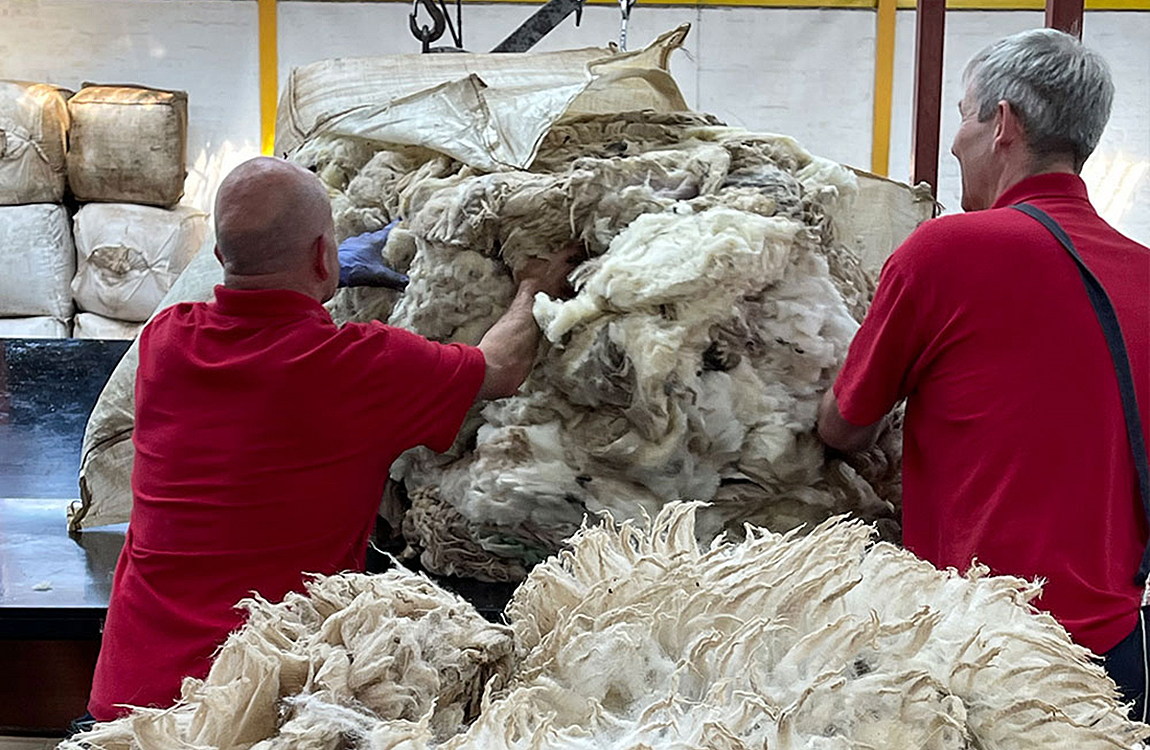
Fleece at the British Wool Grading Depot.
How Wool Biodegrades
Wool fibres have natural properties that allow them to perform differently from other fibres. We already know that wool is a 100% natural and renewable fibre, but it can also biodegrade. Exposed to living things such as soil, fungi and bacteria, the natural proteins in wool begin to break down into its environment without harming its surroundings or contributing to pollution. Wool manages to release essential nutrients back into the soil. This process can take as little as three to four months, depending on the environmental conditions. The warmer and wetter conditions are, the quicker the process.
The Campaign For Wool
The Campaign for Wool is an organisation that operates worldwide to raise the profile of wool as a natural and sustainable fibre for both fashion and interiors. Launching in 2010, the Campaign for Wool has worked hard for over ten years to share its knowledge and educate multiple different industries on the benefits of wool.
They are funded by British Wool, alongside many other wool-based organisations across the globe. Have a look at their website to find out more about what they do and how you can get involved.
British Wool
Operating since 1950, British Wool handles the collection, hand grading and core testing on every bale of wool they receive as well as the marketing and sales of wool throughout the UK. Owned by around 35,000 sheep farmers in the UK, all the wool they process is from British farms. They have eight grading depots across the UK and can process wool from all UK wool producers irrespective of type, location, and quantity.
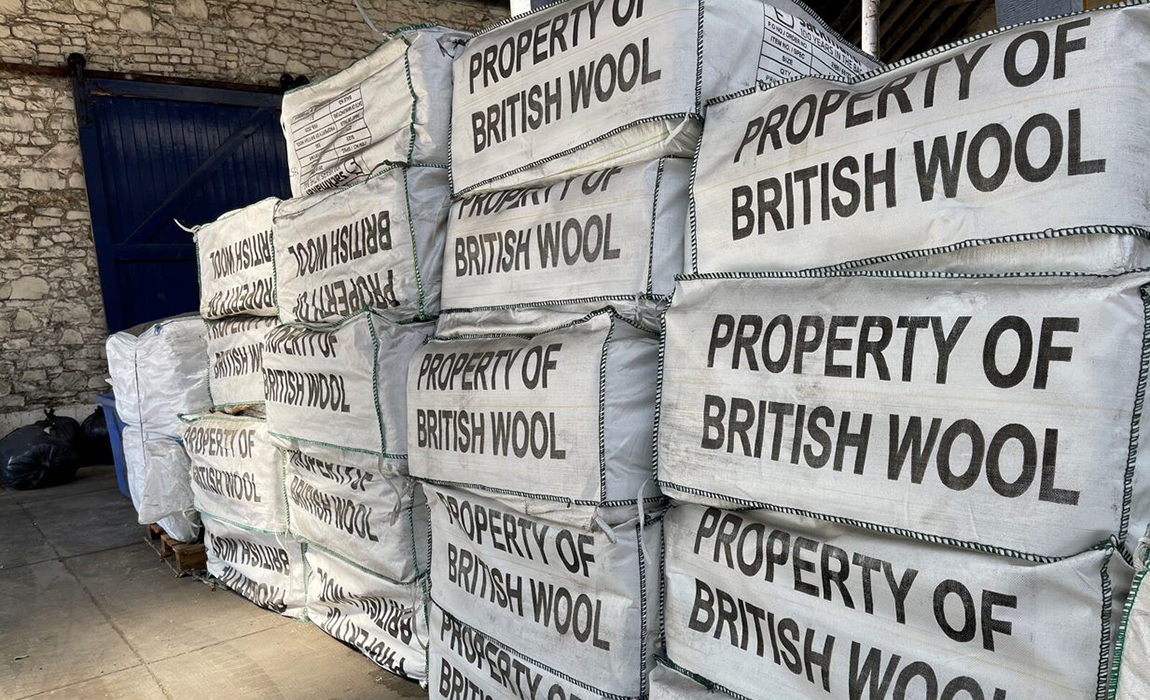
Bags of fleece at the British Wool Grading Depot.
Their operations follow six key values which include: being kind to animals, environmental sustainability, quality assurance, traceability, social responsibility, and use of non-mulesed wool. Their main objective is to increase demand of sustainable British Wool and ensure farmers receive the highest possible profit for their wool. They do this by adding value to the wool through grading and selling the wool at auctions during the year, operating on behalf of their members. Their board consists of nine farmers, who represent nine different regions in the UK, they oversee the activities of the organisation. This ensures British Wool are looking out for their members best interests.
At the moment, British Wool is not traceable back to the individual farm. This is because the average farm size in UK is incredibly small, with only 350 sheep per farm. The UK has a very traditional, small, non-intensive ways of sheep farming, and it takes a lot of different sheep farmers wool to make one auction lot, usually eight tons of a specific grade of wool (same length, strength, colour). Therefore, when the wool is graded different farmer’s wool of the same grade is combined.
British Wool do offer full regional traceability, so we know that the wool we purchase locally from their Selkirk depot was grown in the Scottish Borders, the type of sheep it came from and that it has been graded in this depot.
The Scottish Wool Process
Our Strome fabric is a 100% Scottish wool product, around 75% of the yarn is from Cheviot wool, found practically on our doorstep in the Scottish Borders, which is blended with Romney Marsh wool, now sourced from Scottish-farmed sheep. This ensures the overall fineness and colour to create the correct yarn is suitable for the cloth's intended use.
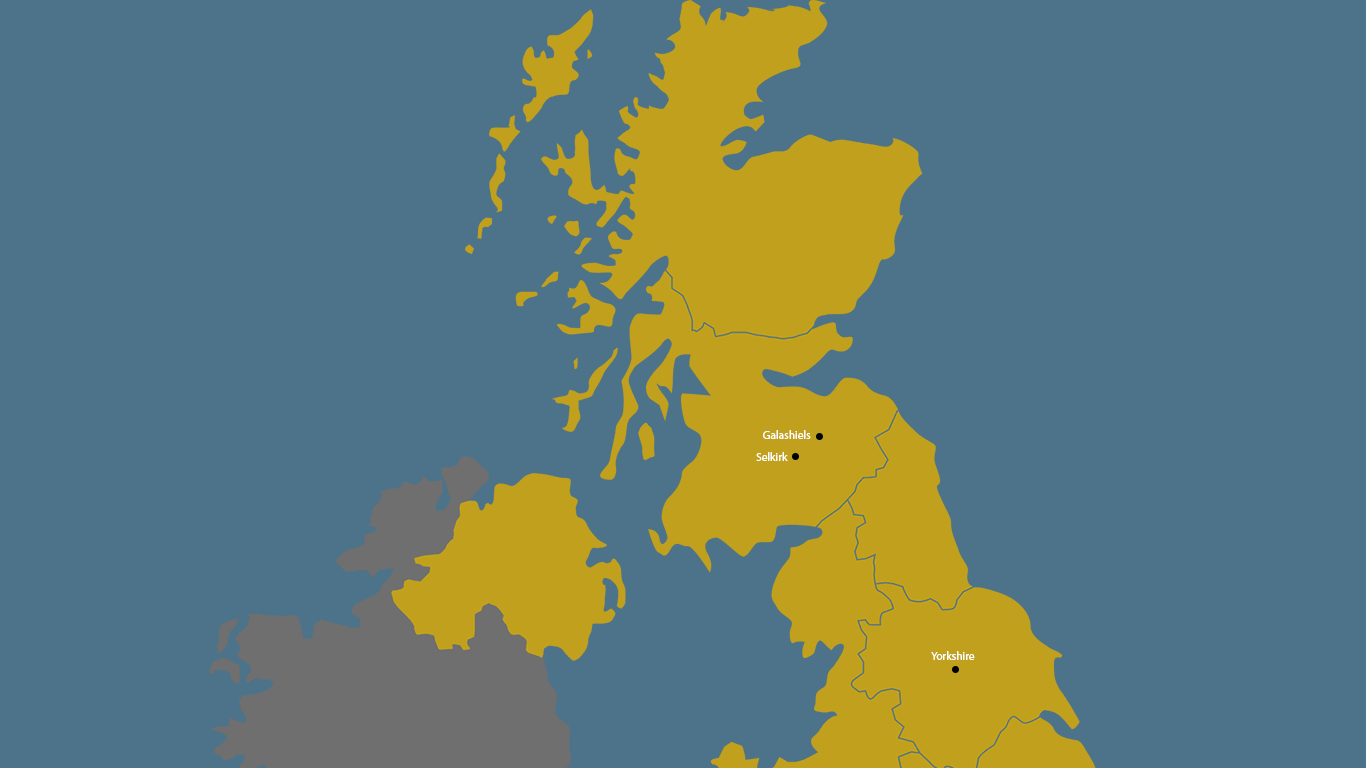
A map of our Scottish wool journey.
The Cheviot Sheep
The breed Cheviot originated in the Cheviot hills of the Scottish Borders and Northumberland, first identified from around 1370. Being well suited for the rugged habitat and conditions of this challenging terrain, they have been described as a “a small hardy race”.
Formed in 1791, The British Wool Society, under the direction of Sir John Sinclair, began to investigate and conduct thorough research on different sheep breeds with the goal of enhancing the natural flock. Upon locating this breed of sheep in the Border’s Cheviot Hills and deciding that their form and fleece made them the ideal mountain sheep, Sir John Sinclair officially gave them the name Cheviot. The Cheviot became the backbone of sheep farming across many hill and mountainous regions across the UK and beyond. Being a strong breed with a long woollen fleece was both practical and beneficial with wool in high demand by the local and national textile manufacturing industry at the time. Cheviots are still farmed today across the uplands of the Borders, and we mainly use their wool in the making of our Strome fabric.
Romney Marsh Sheep
Likewise with Cheviot sheep, Romney Marsh sheep were named after the location they derived from, Romney Marsh in England, being officially acknowledged as a breed of sheep in England by the 19th century. They produce high quality fleece, thick and long which is perfect for spinning, making it a suitable wool for creating cloth. Being versatile sheep who thrive in cold and wet environments, allows them to adapt easily to the Scottish climate, enabling us to create our 100% Scottish wool Strome fabric.
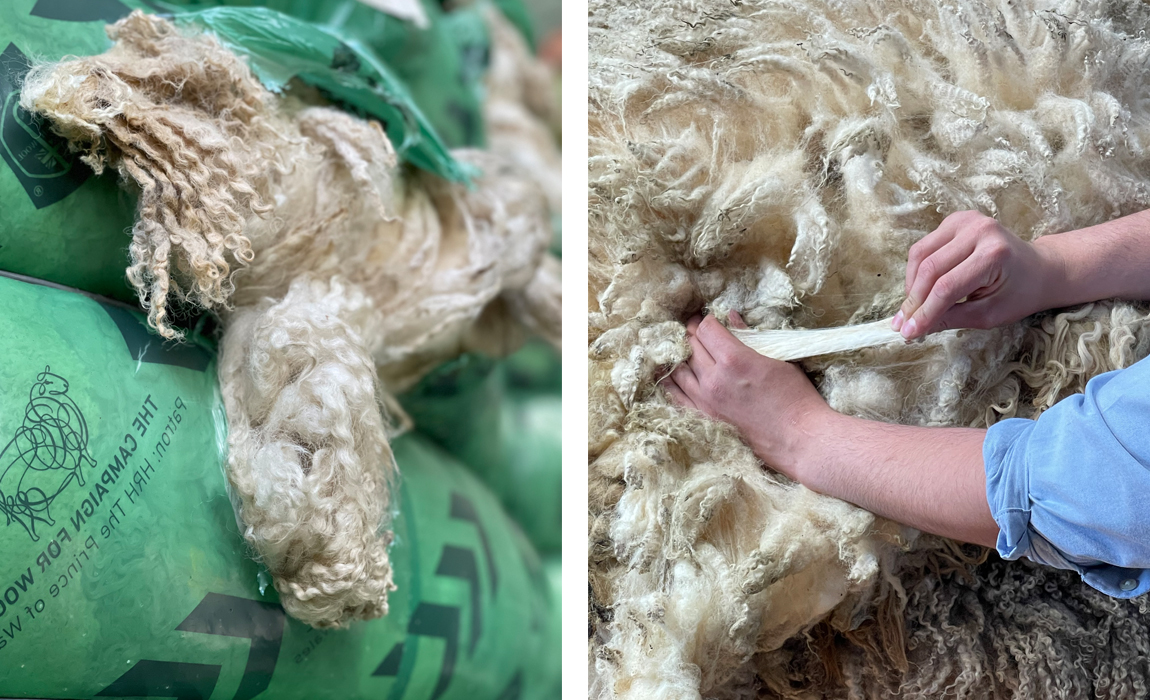
Fleece at the British Wool Grading Depot
Sourcing the Fibre
Sourced from Scottish farmers, the fleece is assessed and sorted by the British Wool depot in Selkirk. They process approximately 4 million kilograms of fleece annually, coming from all over Scotland and as far south as Carlisle. Over 400,000 kilograms of the fleece they process is from Cheviot sheep.
This sorting office has recently relocated here in Selkirk from their depot in Galashiels and officially opened on the 2nd of August 2023. This was a big investment for British Wool but worthwhile as their previous depot in Galashiels was split into two sites which was ineffective and presented additional challenges. Now, operating from only one location they can work more efficiently, improve their service, and develop their operations to provide the best price for wool for their members. For over 70 years, British Wool has been situated in the Scottish Borders, supporting textiles and local farming industries and the new Selkirk depot is now British Wool’s largest grading depot in the UK. It features five grading tables and three packers, allowing them to sort through, at most, six million kgs of wool a year.
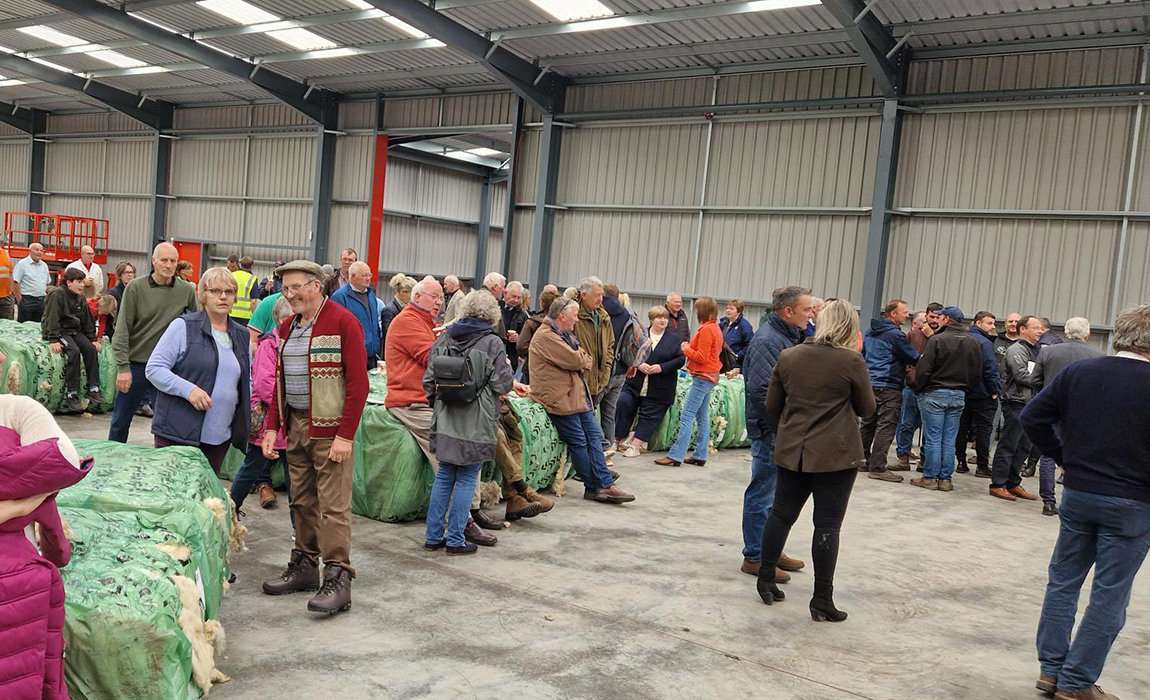
Grand opening of the British Wool Depot in Selkirk.
Their grading procedure ensures they achieve the highest level of quality assurance and each of their qualified graders has been trained for at least three years. The process involves their team grading each woollen fleece by hand, enabling them to establish the style and quality of the wool. This is determined by inspecting the handle, micron, colour, staple, length, and strength of the wool and separating their premium wool from grey fibre, kemp, and any vegetation. Once the wool has been graded it is now quality assured and fit for purpose.
To demonstrate their authenticity, British Wool use the ‘Shepherds Crook Mark’ logo to verify that the wool has been checked at every processing/manufacturing stage and that the wool can be traced back to British wool auctions. Providing the customer with the knowledge that their purchase has been made from genuine British wool sourced from British sheep farmers. We use this mark on all our British Wool sourced products to verify their authenticity.
Scottish Wool back at Lochcarron of Scotland
After the raw wool is graded, cleaned, and spun into tops, it is then taken to Spectrum Yarns Ltd in the heart of the Yorkshire textile centre where it is spun into yarn. Once the freshly spun yarn is delivered back to us at the Lochcarron of Scotland HQ in Selkirk, it is ready to be passed through the hands of our skilled craftspeople though dyeing, warping and weaving the yarn into the tartan fabric we produce. Once the cloth has been woven, it is then sent to our partners Schofields Textile Dryers and Finishers, based in Galashiels, for the finishing process.
When previously woven using wool from New Zealand, our kilt cloth fibre covered approximately 15,000 miles before reaching our HQ. By sourcing our wool for our Strome cloth more locally, within Scotland, we are reducing the carbon footprint of our fabric. Now, this cloth covers under 400 road miles!
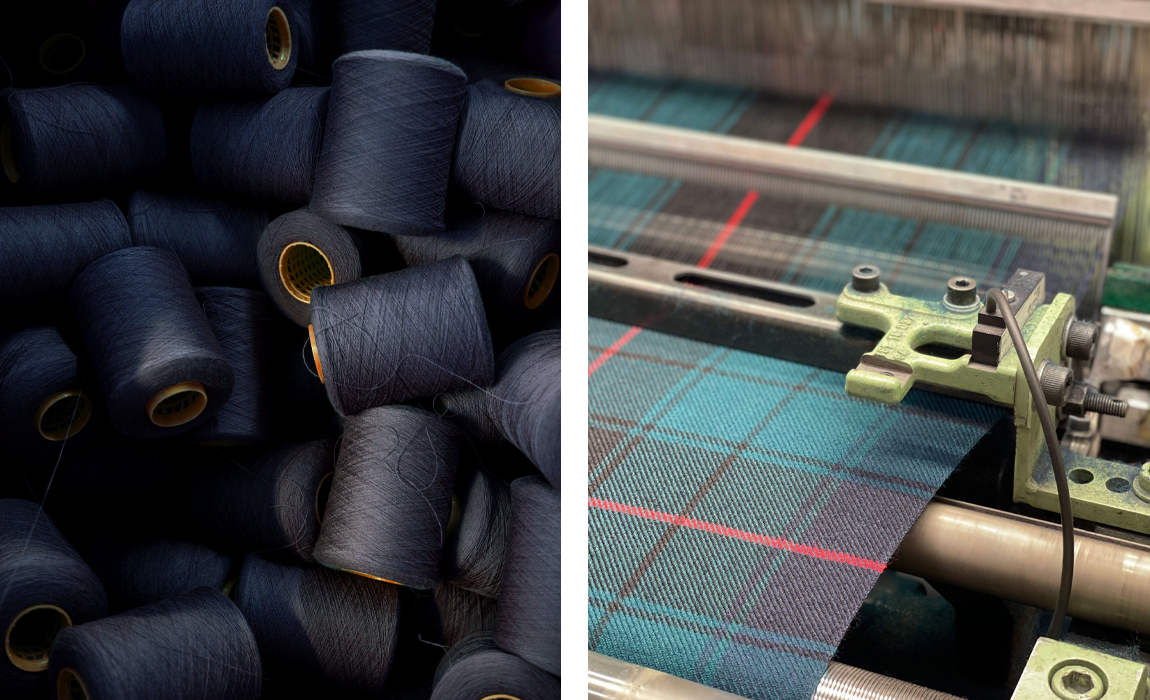
Yarn in our production yarn store at Lochcarron of Scotland. Davidson Clan Modern Heavyweight Tartan weaving on the loom.
Our Scottish Wool Strome Kilt Cloth
Our Heavyweight Strome tartan fabric is available in over 400 authentic tartans in 100% Scottish wool, woven in our mill in Selkirk, Scotland. This quality of tartan material is the heaviest in our range of cloth weights and considered by many to be the best kilting fabric in Scotland, the tartan of choice for many kiltmakers and pipe bands worldwide.
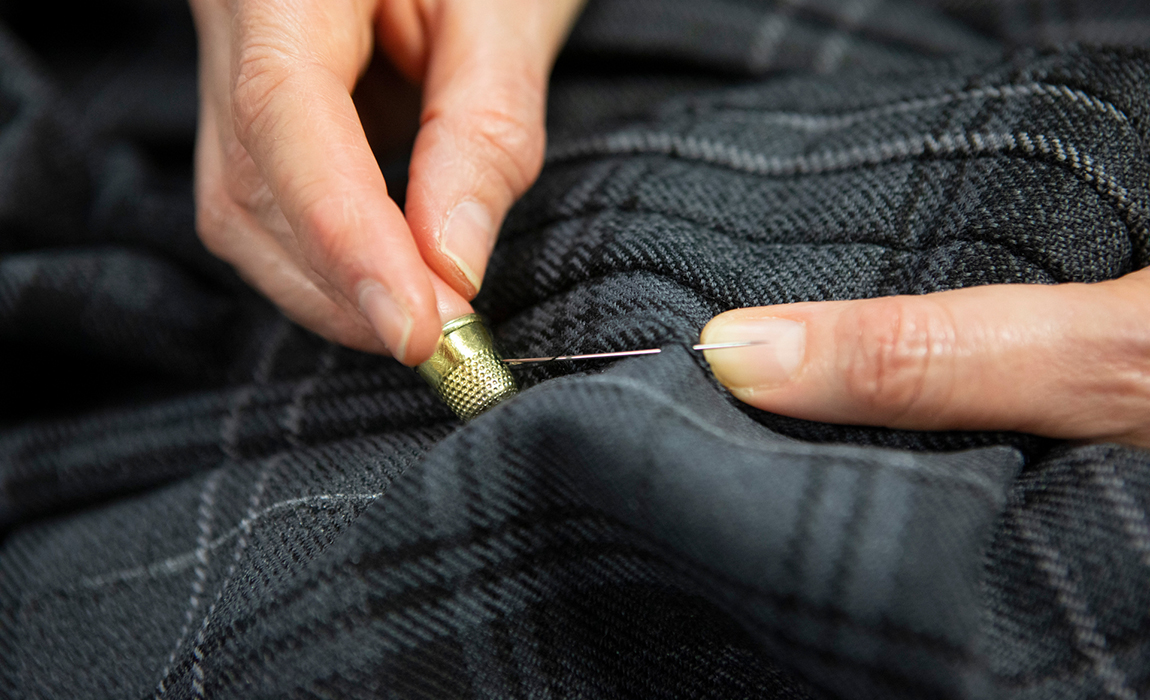
Highland Granite Heavyweight Tartan Kilt being made by skilled kiltmakers.
As we improve our environmental and sustainable credentials, we want to be transparent with our customers and invite them to learn more about our sustainability aims. We are continuing to improve our ethical and sustainable journey by increasingly sourcing wool from Scottish and British farmers, providing a unique authenticity, and showcasing the very best, high quality textiles.
Let us bring a little bit of Scotland to you and the ones you love with our abundance of beautifully crafted products and accessories to make any occasion that little bit more special. From luxuriously soft cashmere accessories to expertly made kilt accessories, we always put something special into our products. All of our fabric and woollen accessories are woven at our mill in Selkirk. Shop online or in store with Lochcarron of Scotland or arrange a Private Fitting Appointment for our bespoke, tailored made-to-measure highland wear. If you are looking for a heavyweight Scottish wool kilt, then as you can see, our Strome fabric makes a perfect choice.

